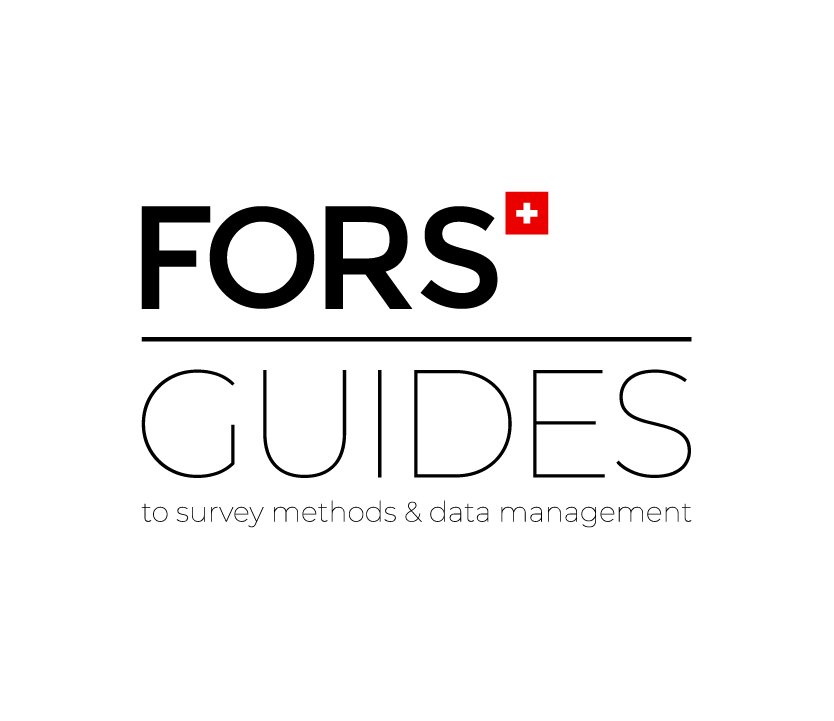Methodological research
Objectives of methodological research at FORS
Methodological research at FORS focuses on the following aspects of data collection:
- coverage challenges and the impact of unit nonresponse and attrition;
- representation and reported data quality of minority groups;
- factors that influence measurement errors;
- interviewer effects on different forms of survey error;
- challenges of conducting surveys in a multilingual context regarding measurement errors.
- research the effectiveness of different modes of data collection and fieldwork methods;
- develop customised data collection strategies for different subgroups;
- identify paradata correlated with response propensities and key survey variables to enable the monitoring of bias throughout the fieldwork phase;
- investigate threats to the continuity of time series due to changes in the survey design.
- the exploration of new technologies for the collection of survey data and the development of best practices;
- the exploration of opportunities to enrich FORS data by linking records and context variables;
- staying up-to-date on alternatives to probability-based sample surveys and on other developments in social science research, such as the use of non-probability-based surveys or collecting data via social networks (big data).
Publications from FORS concerning methodological research
Income Imputation in Longitudinal Surveys: A Within-Individual Panel-Regression Approach. Lipps Oliver, Kuhn Ursina, 2023/08/08. Survey Research Methods , 17 (2) pp. 159–175. Peer-reviewed. [URN][DOI][serval:BIB_2780463D3235]
Effects of Changing Modes on Item Nonresponse in Panel Surveys. Lipps Oliver, Voorpostel Marieke, Monsch Gian-Andrea, 2023/06/01. Journal of Official Statistics, 39 (2) pp. 139-149. [URN][DOI][serval:BIB_9CA10E54B4E0]
Das Longitudinale Mixed Methods-Design der PICE-Studie (Parental Investment in Children’s Education). Kamm Chantal, Heers Marieke, Sandra Hupka-Brunner, Gomensoro Andrés, 2023/03/06. TREE Technical Paper Series.[serval:BIB_8D38C235D3AF]
Qualitative data anonymisation: theoretical and practical considerations for anonymising interview transcripts. Diaz Pablo, Stam Alexandra, 2023/03/01. FORS GUIDES . [URN][serval:BIB_1EEA4C9B2249]
Combining data collection modes in longitudinal studies. Roberts Caroline, Voorpostel Marieke, 2023/01/12. dans Withstanding Vulnerability throughout Adult Life. Dynamics of Stressors, Resources, and Reserves, Palgrave.
[URN][serval:BIB_27ED196CB03A]
Identifying Research Quality in the Social Sciences. Ochsner Michael, 2022/04/12. pp. 48-66 dans Engels Tim C. E., Kulczycki Emanuel (eds.) Handbook on Research Assessment in the Social Sciences chap. 4, Edward Elgar. [URN][serval:BIB_AB4513EFF8D6]
Data Privacy Concerns as a Source of Resistance to Complete Mobile Data Collection Tasks Via a Smartphone App. Roberts Caroline, Herzing Jessica M E, Sobrino Piazza Jimena, Abbet Philip, Gatica-Perez Daniel, 2022/06/17. Journal of Survey Statistics and Methodology. Peer-reviewed. [URN][DOI][serval:BIB_401A1E3B938E]
Effects of Question Characteristics on Item Nonresponse in Telephone and Web Survey Modes. Lipps Oliver, Monsch Gian-Andrea, 2022/08/28. Field Methods pp. 1525822X2211158. Peer-reviewed. [URN][DOI][serval:BIB_3872C7C469BE]
Conditional distributions of frame variables and voting behaviour in probability‐based surveys and opt‐in panels. Pekari Nicolas, Lipps Oliver, Roberts Caroline, Lutz Georg, 2022/09/27. Swiss Political Science Review. Peer-reviewed. [URN][DOI][serval:BIB_2D4AF9BBD0F8]
The effect of unemployment on couples separating in Germany and the UK. Di Nallo Alessandro, Lipps Oliver, Oesch Daniel, Voorpostel Marieke, 2021/10/02. Journal of Marriage and Family. [URN][DOI][WoS][serval:BIB_EAC9DFE18DEE]
Sequentially mixing modes in an election survey. Lipps Oliver, Pekari Nicolas, 2021/05/18. Survey Methods: Insights from the Field. Peer-reviewed. [URN][serval:BIB_E795D2CD150A]
Panel surveys: advantages and disadvantages compared with repeated cross-sectional surveys. Lipps Oliver, 2021/03/19., FORS. [URN][serval:BIB_E2F53D267478]
Mixing modes in household panel surveys: Recent developments and new findings. Voorpostel Marieke, Lipps Oliver, Roberts Caroline, 2021. dans Advances in Longitudinal Survey Methodology, Wiley. [serval:BIB_2B0D4F458D36]
Transforming a Patient Registry Into a Customized Data Set for the Advanced Statistical Analysis of Health Risk Factors and for Medication-Related Hospitalization Research: Retrospective Hospital Patient Registry Study. Taushanov Z., Verloo H., Wernli B., Di Giovanni S., von Gunten A., Pereira F., 2021/05/11. JMIR medical informatics, 9 (5) pp. e24205. Peer-reviewed. [DOI][WoS][Pmid][serval:BIB_23E7F1CBEE88]
Integrating online data collection in a household panel study: effects on second-wave participation. Voorpostel Marieke, Roberts Caroline, Ghoorbin Margarita, 2021. Survey Methods: Insights from the Field. [DOI][serval:BIB_5A25D1757E21]
The European Values Study 2017: On the Way to the Future Using Mixed-Modes. Luijkx Ruud, Jónsdóttir Guðbjörg Andrea, Gummer Tobias, Ernst Stähli Michèle, Frederiksen Morten, Ketola Kimmo, Reeskens Tim, Brislinger Evelyn, Christmann Pablo, Gunnarsson Stefán Þór et al., 2020/11/24. European Sociological Review. Peer-reviewed. [URN][DOI][serval:BIB_44A99FABE750]
Investigating the Relative Impact of Different Sources of Measurement Non-Equivalence in Comparative Surveys. An Illustration with Scale Format, Data Collection Mode and Cross-National Variations Roberts Caroline, Sarrasin Oriane, Ernst Stähli Michèle, 2020/10/10. Survey Research Methods, 14 (4) pp. 399-415. Peer-reviewed. [URN][DOI][serval:BIB_424A8E8E756E]
A cross-validation of R-indicators as a measure of the risk of bias using data from a non-response follow-up survey. Roberts C., Vandenplas C., Herzing J. M. E., 2020/07/28. Journal of Official Statistics, 36 (3) pp. 675–701. Peer-reviewed. [URN][DOI][serval:BIB_EA0D21AB221D]
Model‐based clustering and analysis of life history data. Scott Marc A., Mohan Kaushik, Gauthier Jacques-Antoine, 2020/05/23. Journal of the Royal Statistical Society: Series A (Statistics in Society), 183 (3) pp. 1231–1251. [DOI][WoS][serval:BIB_63E2D591D61E]
Can Interviewer Evaluations Predict Short-Term and Long-Term Participation in Telephone Panels? Lipps Oliver, Voorpostel Marieke, 2020/03/01. Journal of Official Statistics, 36 (1) pp. 117-136. Peer-reviewed. [URN][DOI][serval:BIB_565DBE25A0B3]
Investigation of alternative interface designs for long-list questions–the case of a computer-assisted survey in Germany. Herzing Jessica M. E., 2020/02/04. International Journal of Social Research Methodology pp. 1-12. Peer-reviewed. [URN][DOI][serval:BIB_565E200A3B73]
For all scientific publications by FORS collaborators see here.
Going beyond the single item: deriving and evaluating a composite subjective wellbeing measure in the Swiss Household Panel
Dawid Gondek, Eduardo García Garzón, Núria Sánchez-Mira, Leen Vandecasteele, Stephanie Steinmetz, Marieke Voorpostel
2023-2
Political interest in Swiss probability-based political and social surveys
Nursel Alkoç
2023-1
Family Diversity: Updating a Household Typology in the Swiss Household Panel
Sandrine Morel
2021-3
Entropy measures of social mobility: The example of the intergenerational transmission of education
Georg P. Mueller
2021-2
Measurement of Sexism, Gender Identity, and Perceived Gender Discrimination: A Brief Overview and Suggestions for Short Scales
Jérôme Blondé, Lavinia Gianettoni, Dinah Gross and Edith Guilley
2021-1
Negative Voting Revisited: The 2020 US Presidential Election
Diego Garzia and Frederico Ferreira da Silva
2020-3
Sequentially mixing modes in an election survey
Oliver Lipps and Nicolas Pekari
2020-2
Introducing web in a refreshment sample of the Swiss Household Panel: Main findings from a pilot study
Marieke Voorpostel, Ursina Kuhn, Robin Tillmann, Gian-Andrea Monsch, Erika Antal, Valérie-Anne Ryser, Florence Lebert, Hannah S. Klaas and Nora Dasoki
2019-2
Effects of topic distribution and topic importance on interest and follow-up response
Oliver Lipps and Alexandre Pollien
2019-1
Item nonresponse and fuzzy logic
Georg P. Müller
2018-1
A research note on the potential impact of panel attrition on the relationship between variables
Marieke Voorpostel, Martina Rothenbühler, Caroline Roberts and Caroline Vandenplas
2017-2
Material deprivation from 1999 to 2013 in Switzerland: How index construction impacts on measured patterns of evolution
Pascale Gazareth and Katia Iglesias
2017-1
The impact of assortative mating on income inequality in Switzerland
Ursina Kuhn and Laura Ravazzini
2016-3
A methodological journey towards integrating a gender perspective into the measurement of violence against women and intimate partner violence
Julien Chevillard, Lavinia Gianettoni, and Véronique Jaquier
2016-2
Who are my people? Strengths and limitations of ego-centered network analysis: A case illustration from the Family tiMes survey
Gaëlle Aeby
2015-5
Psychometric properties of extra-short Big Five personality measures in multi-topic surveys: Documenting personality traits in the SHP and MOSAiCH
Valérie-Anne Ryser
2015-4
An evaluation of the CASP-12 scale used in the Survey of Health, Ageing and Retirement in Europe (SHARE) to measure Quality of Life among people aged 50+
Carmen Borrat-Besson, Valérie-Anne Ryser and Judite Gonçalves
2015-1
Non-observation bias in an address-register-based CATI/CAPI mixed mode survey
Oliver Lipps
A different version of this paper has meanwhile been published as :
Lipps, O. (2016). Non-observation bias in an address-register-based CATI/CAPI mixed mode survey.
Methods, Data, Analyses 10(1): 5-24. DOI: 10.12758/mda.2016.001.
2014-3
Robustness of items within and across surveys
Caroline Vandenplas and Oliver Lipps
2014-2
A Versatile tool? Applying the Cross-national Error Source Typology (CNEST) to triangulated pre-test data
Rory Fitzgerald, Lizzy Winstone and Yvette Prestage
2014-1
Learning, understanding, and motivation effects on “don’t know” in panel surveys
Oliver Lipps
2013-04
The Swiss Rolling Cross-Section Study : Design, field work, and data quality
Georg Lutz, Thomas de Rocchi and Nicolas Pekari
2013-03
Mode and incentive effects in an individual register frame based Swiss election study
Oliver Lipps and Nicolas Pekari
A different version of this paper has meanwhile been published as :
Lipps, O., & Pekari, N. (2016). Sample Representation and Substantive Outcomes Using Web With and Without Incentives Compared to Telephone in an Election Survey. Journal of Official Statistics, 32(1), 165-186.
2013-02
Coverage and nonresponse errors in an individual register frame based Swiss telephone election study
Oliver Lipps, Nicolas Pekari and Caroline Roberts
A different version of this paper has meanwhile been published as :
Lipps, O., Pekari, N., & Roberts, C. (2015). Undercoverage and Nonresponse in a List-sampled Telephone Election Survey. Survey Research Methods, 9(2), 71-82.
2013-01
Using the Swiss population register for research into survey methodology
Caroline Roberts, Oliver Lipps and Kathrin Kissau
2012-01
Satisficing and language proficiency
Brian Kleiner, Oliver Lipps and Eliane Ferrez
A different version of this paper has meanwhile been published as :
Kleiner, B., Lipps, O., & Ferrez, E. (2015). Language Ability and Motivation Among Foreigners in Survey Responding. Journal of Survey Statistics and Methodology, 3(3), 339-360.
2011-01
Predictability of reasons for refusal in telephone surveys
Oliver Lipps
A different version of this paper has meanwhile been published as :
Lipps, O. (2012). Using information from telephone panel surveys to predict reasons for refusal. Methoden – Daten – Analysen 6 (1) : 3-20.
2010-03
Dialect-driven adaptation : Experiences from Switzerland
Isabelle Renschler, Brian Kleiner, and Martina Bichsel
A different version of this paper has meanwhile been published as :
Renschler, I., & Kleiner, B. (2013). Considering Dialect in Survey Research. Bulletin of Sociological Methodology/Bulletin de Méthodologie Sociologique, 118(1), 51-59.
2010-02
Contact time optimization in panel surveys
Oliver Lipps
A different version of this paper has been published as :
Lipps, O. (2012). A Note on improving Contact Times in Panel Surveys. Field Methods 24 (1) : 95-111.
2010-01
Income imputation in the Swiss Household Panel 1999-2007
Oliver Lipps
2009-01
Innovations and new technologies in panel research
Annette Scherpenzeel
This working paper combines parts of three other publications by the same author :
Scherpenzeel, A. & Das, J.W.M. (2010). ’True’ longitudinal and probability-based internet panels : Evidence from the Netherlands. In : Das, J.W.M. ; Ester, P. ; Kaczmirek, L. (Ed.) Social and Behavioral Research and the Internet : Advances in Applied Methods and Research Strategies.
Scherpenzeel, A. & Bethlehem, J. (2010). How representative are online-panels ? Problems of coverage and selection and possible solutions. In Social Research and the Internet : Advances in applied Methods and New Research Strategies. Eds. M.Das, P.Ester & L.Kaczmirek. New York : Routlegde Academic.
Scherpenzeel, A., & Toepoel, V. (2012). Recruiting a Probability Sample for an Online Panel : Effects of Contact Mode, Incentives, and Information. Public Opinion Quarterly, 76(3), 470-490.
Measurement of income in surveys (FORS Guide N°02), Ursina Kuhn
Refusal conversion (FORS Guide N°04), Marieke Voorpostel
Surveying national minorities (FORS Guide N°06), Jessica M.E. Herzing, Guy Elcheroth, Oliver Lipps, Brian Kleiner
Incentives in surveys (FORS Guide N°08), Oliver Lipps, Jessica M.E. Herzing, Nicolas Pekari, Michèle Ernst Stähli, Alexandre Pollien, Gisana Riedo, Maud Reveilhac
Measurement of social position in surveys (FORS Guide N°10), Robin Tillmann
Measuring party affiliation (FORS Guide N°12), Georg Lutz, Lukas Lauener
Preparation of survey data (FORS Guide N°13), Alexandre Pollien, Jessica M. E. Herzing, Erika Antal
Panel surveys: advantages and disadvantages compared with repeated cross-sectional surveys (FORS Guide N°14), Oliver Lipps
Representativeness of surveys and its analysis (FORS Guide N°15), Michael Ochsner
Data Linkage (FORS Guide N°18), Giannina Vaccaro, Elfie Swerts
Measuring psychological constructs (FORS Guide N°22), Valérie-Anne Ryser




 Bâtiment Géopolis,
Bâtiment Géopolis, +41 (0)21 692 37 30
+41 (0)21 692 37 30

